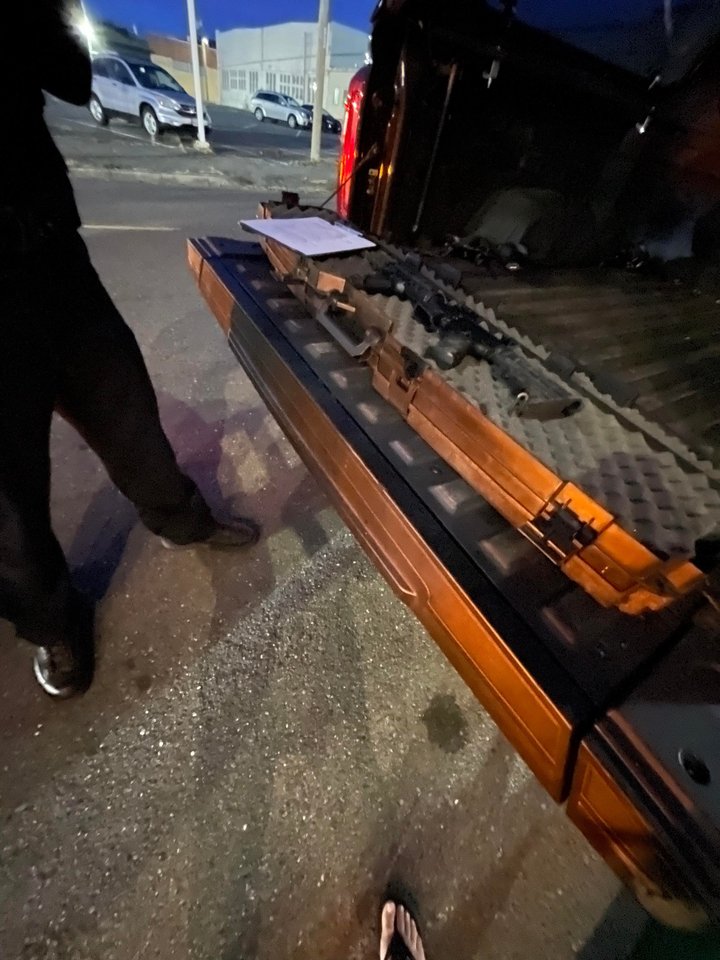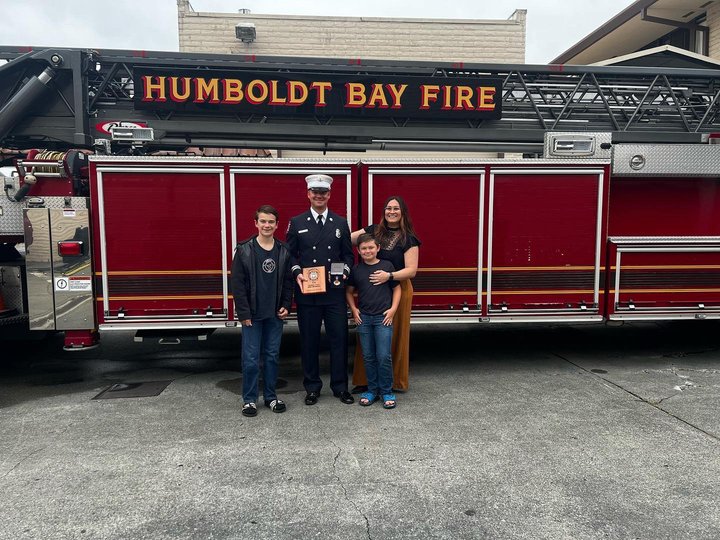Photos courtesy Felicia Goodman.
###
When Felicia and Johnathan Goodman first saw photos showing the faces of the 19 children killed in last month’s mass shooting at Robb Elementary School in Uvalde, Texas, they couldn’t help but see a reflection of the faces of their own school-aged kids.
“I don’t see how anybody can not be emotionally affected, but I think as parents we felt like, you know, this has got to stop,” Felicia Goodman told the Outpost in a phone interview.
She couldn’t even bring herself to read the first wave of news stories coming out of Uvalde. “It was just too gut-wrenching,” she said. But she quickly realized that there was one change she and her husband could make in their own home — a small sacrifice that could potentially prevent a future tragedy. She called her husband and said she wanted to get rid of their AR-15.
“There’s no need for us to have an AR-15 in our house,” she said. “We’re responsible gun owners, but you never know. I mean, we have kids who have friends over and, you know, … nobody ever thinks that their child will grow up to be somebody that does something heinous. But why even have the opportunity for our kids or their friends or anybody to have access to an AR-15?”
This model of semi-automatic grew to become “one of the most beloved and most vilified rifles in the country” in recent years. A version of the AR-15, rechristened as the M16, was issued to American ground troops in Vietnam, and the National Rifle Association has referred to it affectionately as “America’s rifle.” That organization attributes the AR-15’s popularity to it being “customizable, adaptable, reliable and accurate” and suggests that it can be used “in sport shooting, hunting and self-defense situations.”
It has also been the gun of choice for many perpetrators of mass shootings. NPR reporters assembled a partial list of when an AR-15-style weapon was used in a mass shooting:
- Feb. 14, 2018: Shooting at Stoneman Douglas High School shooting in Florida leaves 17 people dead.
- Oct. 1, 2017: The Las Vegas slaughter of 58 people.
- Nov. 5, 2017: The Sutherland Springs, Texas, church shooting that claimed 26 lives.
- June 12, 2016: The Pulse nightclub shooting in Orlando, Fla., that left 49 dead.
- Dec. 2, 2015: The San Bernardino shooting that killed 14 people.
- Dec. 14, 2012: The shooting at Sandy Hook Elementary School in Connecticut that took 27 lives.
The Uvalde tragedy is the latest addition to that list.
Goodman said their AR-15 formerly belonged to her brother-in-law, and when she and her husband found out that he planned to sell it, they decided to take it.
“We were like, ‘Oh, it would be kind of like cool to have this high-powered weapon. We could take it shooting at the river bar [or] at a range.’ … I mean, we had really no use for it other than just as a hobby.”
In light of the Uvalde mass shooting, she wanted the gun gone — not just out of the house but destroyed, she said. As a firefighter, her husband has contacts in law enforcement, so they reached out to the Eureka Police Department and arranged a time to meet officers at the department, fill out the necessary paperwork and surrender the weapon.
“It was really easy and simple,” Goodman said. “It took about 15 minutes.”
Brittany Powell, spokesperson for the Eureka Police Department, said the agency has done about 30 firearm surrenders since 2018. The previous year, 48 firearms were surrendered to the department during a two-day gun buyback program. Powell said the City of Eureka is exploring the idea of having another buyback event in the future.
It’s uncommon, however, for local people to surrender their guns in response to a mass shooting, according to local law enforcement officials.
“The most common scenarios are non-functioning firearms laying around the house or family members turning in firearms that had belonged to their loved one,” Powell said via email.
Samantha Karges, public information specialist with the Humboldt County Sheriff’s Office, said the agency does not have an official program for surrendering weapons but will accept them from residents within the county’s jurisdiction when needed.
“I don’t have any statistics readily available regarding the number of firearms surrendered per year, but if we had to estimate it would be pretty low,” Karges said in an email. “Many of the firearms that are surrendered to our department are due to a Restraining Order or a legal order preventing the person from possessing firearms.”
Arcata Police Chief Brian Ahearn said his department doesn’t have a buyback program either, though he said it does happen.
“Weapons are usually transported in bulk to a private company who then melts them down and utilizes the raw materials for other purposes, I think,” Ahearn said in an email. “Not many people surrender firearms so I do not have a lot of expertise in this area.”
Powell said all firearms surrendered to the Eureka Police Department are destroyed, while Karges said residents are given the option to either donate the firearm or have it destroyed.
“Donated firearms are sold and the money goes back to the department to purchase equipment,” Karges said. “Firearms marked for destruction are destroyed.”
Goodman would like to see more people make the decision that she and her husband made.
“So many of us talk about the change that needs to happen, but a lot of people are unwilling to be the change — and it’s so simple,” she said. “I hope that other people are moved to do the same.”
They still have firearms in their home, including a shotgun that they plan to keep for home protection.
“But I just don’t feel like there’s a reason for an AR-15,” she said. “If police officers were too afraid to go into the school [in Uvalde] to stop the shooting sooner because this person had an AR-15, what the fuck am I gonna do with it? … It needs to be a little bit harder for people to get these guns.”
If you or anyone you know is interested in surrendering a firearm, Powell and Karges offered some pointers.
For the Sheriff’s Office, Karges said, “In order to surrender a firearm or any other type of weapon, an individuals needs to call our main office and request a weapon surrender. A call for service will be created in our system and a deputy will be assigned to meet the person and pick up the surrendered items.”
The main office number is (707) 445-7251.
For the Eureka Police Department, Powell said, “When surrendering a firearm we ask that the firearm is brought unloaded and secured somewhere like a locked case and/or trunk. The firearm should stay in the vehicle and an officer will meet [you] outside. A field property receipt is then signed, clearly labeling the firearm as surrendered. All surrendered firearms are then destroyed.”
The Eureka Police Department can be reached at (707) 441-4060.
The Arcata Police Department can be reached at (707) 822-2428.
We reached out to the Fortuna Police Department for this story but did not hear back before the time of publication.
Johnathan and Felicia Goodman and their kids.


CLICK TO MANAGE